The California Supreme Court on Thursday upheld a law that allows app-based rideshare and delivery companies to treat their drivers as independent contractors instead of employees, handing a victory to the companies that put the initiative on the ballot in 2020.
The justices’ unanimous decision focused on a clause in the industry-backed Proposition 22 that excluded app-based drivers from the state workers’ compensation system. The court declined to invalidate the law over a challenge brought by four drivers and the Service Employees International Union, which argued that Prop. 22 conflicted with the state Legislature’s constitutional powers to set those benefits.
The court found that the Legislature does not have the sole authority to govern the workers’ compensation system. The law “does not preclude the electorate from exercising its initiative power to legislate on matters affecting workers’ compensation,” Justice Goodwin Liu wrote in the ruling.
Uber, Lyft and Doordash, among other companies, spent more than $200 million to back Prop. 22, which was approved by 59% of voters in November 2020. The ballot initiative was in response to AB 5, a state law that made it more difficult to classify drivers as independent contractors.
